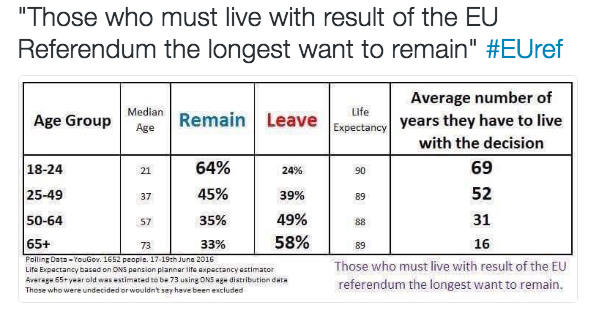Now on Both Sides of the Atlantic: The Murdochian Candidates
Chaos reigns, both in London and Gotham. In the shadows, the puppet-maker now works around the clock, enticed by events unfolding beyond even his great powers. Undaunted by what might have been an earth-shaking, career-defining scandal and rejuvenated by the prospects for the future by wife #4, he resumes his favorite pastime, king-making for No. 10 and the White House. In 2016, though, Rupert Murdoch, the world’s leading billionaire maker of men, seeks a rare trifecta.
During the week when a Murdoch favorite, the charisma-deficient, clapping-impaired Michael Gove, threw Boris Johnson under a double-decker, Murdoch’s chumminess with and support for Donald Trump only grew. Even before Gove had fully pulled the bloody stave from Johnson’s back, the “et tu” theme (wonderful, only-in-the-U.K. tab front pages documented the tragic drama) marched into Friday. The Daily Mail, Murdoch’s main newspaper competitor, surprised Gove, and his wife Sarah Vine — a Daily Mail columnist! — by unexpectedly endorsing Theresa May for the Tory leadership position Gove had just killed for. Yet Murdoch’s Sun played it even smarter.
Story Continued Below
The Sun hedged, saying good things about both Gove and May, the surer to back a post-Brexit winner. If there is anything the 85-year-old Murdoch wants on his tombstone, it is that single word: Winner.
This is still another Murdoch moment in history. The owner of the world’s largest newspaper company seeks to crown his career by assuming behind-the-throne leverage on three continents. It is a quest for power on as grand a scale has the world’s last remaining media titan has ever sought.
First published at POLITICO
Follow Newsonomics on Twitter
If he were given to wistfulness, Murdoch could look fondly back at his relatively modest Aussie roots, but he hasn’t been content to do that. Just last week, his News Corp Australia acquired another chain of dailies. Murdoch bought, for a paltry $27 million ($36.6 million AU), 12 dailies, 60 community newspapers and 30 news websites in regional Queensland and New South Wales, from APN News and Media. Before this sale, Murdoch’s Australian press arm had controlled at least 60 percent of Australia’s daily newspaper trade. In the Northern Hemisphere, we follow too little the mogul’s use of his influence in the Southern, but it’s well-documented. As Australia finds itself in the midst of its own leadership question, Murdoch’s continuing effort to wield influence is clear. Using the playbook he’s tweaked over a lifetime of dealing, he effortlessly mixes gaining advantage for his own businesses with policy power plays. In Australia, and elsewhere, those exercises in influence include a misinformed embrace of those who deny global warming, with great consequences to us all.
That’s long-term mischief-making. Murdoch won’t live to see the more dire results of climate change that have just begun to exact their human and economic costs on all societies.
In the shorter term, Murdoch finds himself content to mess with the longest comity Europe has found in a millennium. We can debate what he really thinks about the value of the new Europe, just as we can wonder about his true thoughts on a warming world. In fact, though, it doesn’t matter. It’s all just collateral impact, to the larger sport of affirming his own interests, political and business, at the highest levels of world governance. If it takes playing to the uninformed with populist doggerel, so be it.
Could the work of terrorism be nearly as effective at wounding Western nations as these men who claim to love their nations so dearly have done? Has anyone else taken such decades-long delight in advancing his own business fortunes, now valued at $11.6 billion, right alongside his own political whimsy?
Rupert Murdoch, longevity indicators would tell us, can plan on an average of 5.8 more years of life expectancy. In that time he has left, he’s playing to his crowd — that older demographic that swung this Brexit vote just far enough over the line to force a new crisis that the nations of the West hardly needed.
Today, Austria once again stands on the brink of electing a far-right as president, and we can bet that Brexit will play into Norbert Hofer’s updated platform. Under-confident Europeans, excoriated in May so well by Pope Francis — “Their new and exciting desire to create unity seems to be fading. We, the heirs of their dream, are tempted to yield to our own selfish interests and to consider putting up fences here and there”— respond to the simplistic nonsense that Murdoch’s Sun put out. And that vote, of course, will only set up a further spiral of economic loss and social division.
In this much-shared graphic via YouGov and the Guardian, we see how the Brexit vote aligned with age,
And, yes, it is the older Leave people who disproportionately read the Leave-exhorting papers. It is both the Daily Mail, by a huge amount, and Murdoch’s Sun, by a good margin, that appeal to older readers, in print. Fifty-nine percent of The Sun’s audience came in at 45+, with 40 percent over 55.
If we want to put a face on Brexit, Rupert Murdoch’s fits the bill. He represents so well those not-quite-to-the-exits older generations blocking the way to a sensible future for the younger generations, who thought themselves both British and European. They will have to live, for a long time, in the aftermath of the past week’s cynical machinations.
With his Sun, Murdoch was able to spread the dark lies of Brexit, which morphed, as polling demanded, from economic nationalism and protectionism to anti-immigrant fear-mongering. That Murdoch’s Times of London didn’t have the option of tipping for Leave — it would have tarnished the brand, bad for business — is a better measure of how far the tabloids went than of how restrained Murdoch’s news megalith can be.
Instead of doing the factual job, explaining the basics of “What is the EU?” and what the actual economic impacts might be of withdrawal, The Sun’s pages fanned the flames of British know-nothing nativism.
It was Murdoch’s Sun — the largest publication by circulation in the country — and its fellow stirrer of public disaffection, The Daily Mail, that swung this election.
Just as politicians scurry to make actual plans for a post-EU future, the victorious press seeks to reclaim a lost, and aging, world, finding a proper standard-bearer, to replace the Neville Chamberlain-esque David Cameron — amid a dearth of political talent.
Meanwhile, in Gotham, I mean New York, Murdoch’s Post occupies a far different landscape and mindscape. As the Post increasingly warms to Trump, likening Brexit to Trump’s new American revolution, Murdoch provided a fresh anointing this week, calling the man who would produce the United States own exit from the world stage “a very able man.”
The Post, of course, won’t deliver any New York electoral votes to Trump. It is Murdoch’s Fox News, certainly the closest thing we have in the U.S. to the xenophobic-for-pay conservative London tabs, which will do that bidding. Now, with four months to go until Murdoch tries to place Trump on a dais next to Gove or May, expect that the made-for-TV Megyn Kelly/Trump feud will pass into future trivia contests. Only emboldened by the “success” of Brexit, Fox will beat the drums of America First, the next sitcom import from the U.K. On Nov. 9, how many Americans will be Googling, “How did Donald Trump really get rich?”
Was it only four years ago that News Corp. honcho Rebekah Brooks was charged with perverting justice in the News Corp. phone-hacking, bribery and eavesdropping scandal?
Some of us noted at the apparent height of Hackgate that Rupert wounded wasn’t Rupert dead. Parliament railed. Boards of inquiry huffed and puffed, but in the end, due to expert crisis management, the Murdochs ducked and revived their fortunes, erasing much public memory about the tawdriness of the affair. A court found Rebekah Brooks not guilty, and she saw her career quickly reborn. It is only two years ago this week that the cases resolved themselves.
The Guardian asked the right question: “Phone hacking trial: now it’s over, has anything really changed?”
The unfortunate answer is, “Yes.” The world is a far shakier, more uncertain, less rational place, a litter of nationalisms nurtured in the womb of democracies. Politicians, as well as a steadier, more sober press are supposed to act as breakers on the wilder enthusiasms of the mob, even when the mob tips into a majority. Yet, that’s not the world — political or press — that we live in today.
In the U.S., we should laud both The New York Times and The Washington Post for their tough-minded stamina in covering the realities of Donald Trump. In the U.K., The Guardian has once again excelled in its passionate and detailed coverage, and new editor Katharine Viner has boldly reminded readers of the price of that coverage, right there on the Guardian’s home age. The Financial Times’ ability to bring in six times more subscribers in the post-Brexit week also tells us that in this era of Bigger Lies, those who loudly report fact and truth will be rewarded by some number of citizens who value what they do. Support them.
And, yet, astoundingly, in 2016, it’s another Murdoch moment. No North Korean brainwashing is required; this isn’t a Hollywood movie we’re watching. On both sides of the Atlantic, clear as day, we see the rise of not one, but two Murdochian Candidates.





